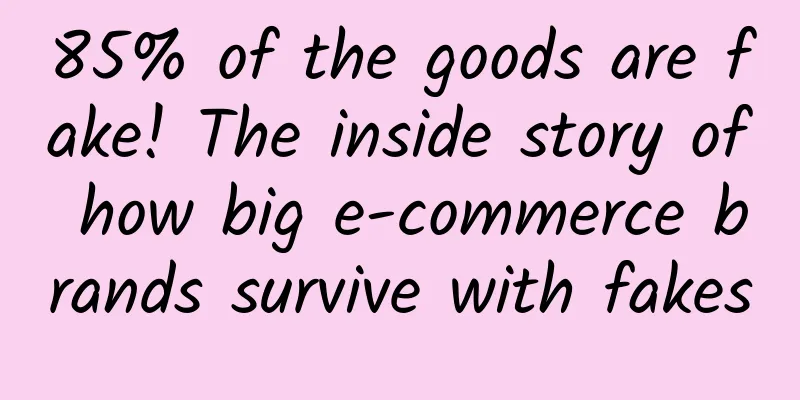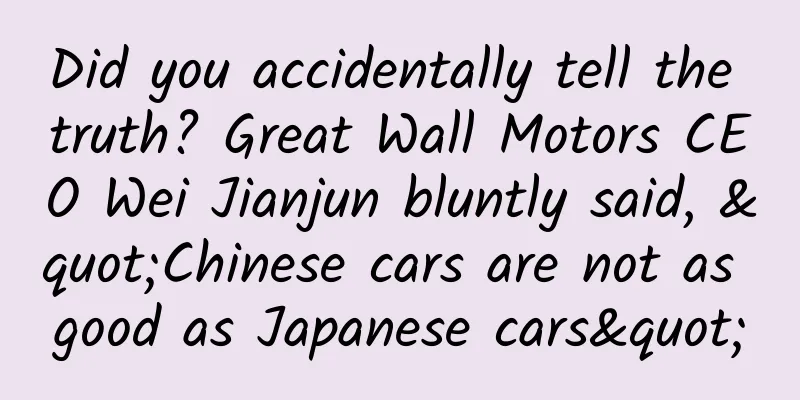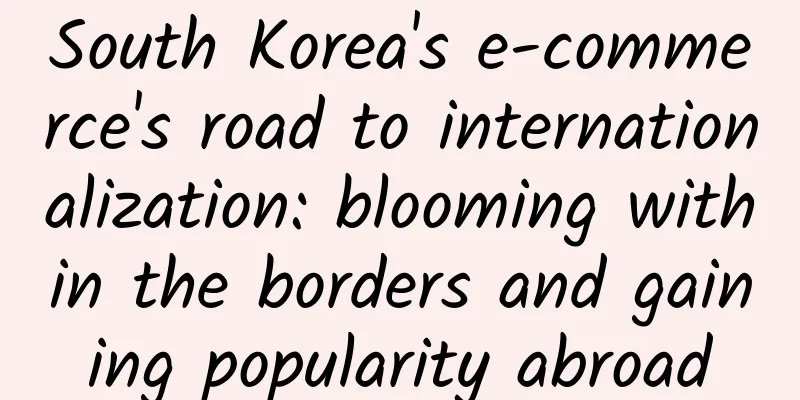85% of the goods are fake! The inside story of how big e-commerce brands survive with fakes

|
Jumei and JD.com’s counterfeit sales have set off an industry hotspot. Obviously, the platform model’s ability to control counterfeit and parallel import goods is being weakened with the “scale legend”. On the contrary, what is being magnified is that consumers’ trust in e-commerce has once again dropped to the freezing point. However, the industry insider revealed to Yibang Power Network by a trader of a first-tier international e-commerce brand is even more shocking: not only are cosmetics e-commerce counterfeit goods rampant and their reputations ruined, but 85% of luxury goods and international brands sold on current e-commerce platforms are counterfeit! The following is a conversation between Yibang Power Network and this industry deep throat. It just so happens that Huang Ruo, a senior e-commerce person and investment consultant of Warburg Pincus, also released his new book “Looking at E-commerce Again” today. Yibang’s editor also asked “Huang Laoxie” about this issue on the spot. Yibang Power Network: Although Jumei Youpin was also questioned in terms of supply control before its listing, there was no substantial evidence to prove it. This time, it was exposed for selling counterfeit goods, and it felt like the truth was revealed. What is even more incredible is that JD.com, which has always boasted of genuine goods, is also implicated. This not only hurts the two listed e-commerce companies, but also makes the e-commerce industry face a crisis of trust. Deep Throat: Trust is the biggest cost. This is also an important reason why international brands are still unwilling to authorize e-commerce platforms. Ebrun Power Network: The problem of counterfeit goods did not start with e-commerce, and the circulation of counterfeit goods offline seems to be more serious. However, fighting against counterfeiting in the domestic market has become a consumer behavior, reporting, complaining, giving bad reviews, and even filing lawsuits. International brands seem to be passive and powerless in dealing with the problem of counterfeit goods. Deep Throat: Who said there is no action, it's just that there is no effect. You must know that the cost of fighting against counterfeiting is very high. It is beyond the imagination of the outside world. In the past few years, the sales of international brands have been growing rapidly, and those Chinese professional managers have not paid attention to it. Ebrun Power Network: Fighting against counterfeiting is a very painful thing. Unless it is linked to the KPI of professional managers, and fighting against counterfeiting is equivalent to sales growth, there will be results. Deep Throat: Yes. But you have to know that the significance of fakes is equivalent to the significance of Jinjiang hospital groups and quack doctors to search engines. A platform operator once said that the greatest pleasure is to sell real and fake goods together and find a balance between tone and income. If a certain brand sells more on the platform, it can attract official brand operators to settle in - because the data has shown that there are many user needs waiting for you here. At this time, the platform operator also began to close the net, clean up fakes, and introduce brand gods. You should know that the condition for Burberry to enter Tmall International is that Tmall and Taobao must clean up all sales channels and drive out fakes. For example, this time, JD.com actually sold parallel imports of motor oil, which was identified as fake by the brand operator in order to clean up the channels. Ebrun Power Network: If listed e-commerce platforms also turn a blind eye to suppliers, this will cause a crisis of trust in e-commerce in the consumer market and the secondary market. Deep Throat: An investor of Jumei Youpin once said that selling fakes has always been known. As long as the officials do not care and the people do not investigate, it will continue as usual. If there is any movement, it will be sold. Before this, investors have already made a fortune. Ebrun: Do those B2C platforms that have obtained authorization from big brands also sell smuggled or fake products? Deep Throat: They are all purchased directly from distributors in European countries, such as Italy. However, it is impossible to identify whether the distributors have adulterated or not, and it cannot be guaranteed 100%. For those high-end brands, domestic e-commerce platforms cannot buy them directly from brand companies, and brands will not sell them to platforms because it will impact the interests of their branches or general agents in the Chinese market. However, it is difficult to supervise the supply of goods sold to local distributors in Europe. Among them, the most terrible situation cannot be ruled out, that is, local distributors buy high-end imitations in China, ship them back to Italy, mix them in and sell them back to China. Ebrun: It's scary. The platform is simply unable to supervise. Those so-called compensation clauses and agreements for selling fakes have become decorations? What if users get serious? Deep Throat: Users need to show the brand company's identification report, which is difficult for ordinary consumers to get. Even if the consumer is very good and takes out the report, the platform's most handling method is to return the goods. Ebrun: You can go to the counter. Deep Throat: Yes, generally the counter will tell the customer that it is a fake. But there are two problems with the counter inspection. First, the ability to distinguish the authenticity needs to be verified, and second, the counter's words are not legally binding. Yibang Power Network: The cost of fighting counterfeiting is high, and the cost of protecting rights is also high, which leads to the rampant fakes. Deep Throat: The goods on the B2C e-commerce channel of luxury goods are visually more than 85% fake. Yibang Power Network: No way? Deep Throat: JD 50%, YT 40%, JM 100%, VIP 70%, XIU 70%... Yibang Power Network: Okay, okay, it's too shocking. What about TM? Deep Throat: The largest volume of TM is YT and Fifth Avenue. Except for the official flagship store, the others are basically fake. Yibang Power Network: E-commerce will not be so unscrupulous. There will be some parallel imports, right? Deep Throat: Fakes! Yibang Power Network: At this point, the brand owners also sit back and do nothing? Deep Throat: Brand owners usually have an ambiguous attitude. This is market thinking, not moral thinking. It has a lot to do with the size of the brand in a certain market and the maturity of the market itself. The problem of counterfeit goods can be divided into three stages: 1. When big brands first enter the Chinese market, they often have a high brand level but have not established a wide market reputation. If someone counterfeits, it is equivalent to doing the work of brand popularization for the brand. At this time, the brand does not need to fight against counterfeiting and adopts a strategy of letting the water flow and raising fish. The most typical example is Microsoft. Although it also called for fighting against counterfeiting in the early days, it tolerated piracy to a certain extent. It took decisive countermeasures only when the market share was high enough. 2. The second stage is the stage of balance in the market share of genuine and counterfeit goods. Big brands can spread their own channels to a certain extent, and tolerate a certain degree of parallel imports and counterfeit goods. 3. The third stage is the anti-counterfeiting stage. At this time, the market has been completely taken over, and there is no need for counterfeit goods to promote me, so I start to close the net. Previously, there was a case where an insider of L'Oréal Paris made centralized purchases and provided evidence for compensation. That supplier is very well-known in the north, and he supplies almost all major e-commerce platforms. It is a bloody fact that he knowingly committed a crime and was caught in the act. When the incident happened, the industry was terrified. The following is a sharp comment made by Huang Ruo, the founder of Taobao Mall and former COO of Dangdang.com, to Yibang Power Network on the sale of counterfeit goods on e-commerce platforms: The e-commerce platform model is actually a very low-end and elementary model, but it is also in line with "Chinese national conditions". The only thing pursued in the retail world is efficiency, unless it is an extremely high-end luxury e-commerce, such as selling Hermes bags, with a gross profit margin of 98%, efficiency does not matter. Efficiency comes from scale and business continuity. But many people are selling on the platform model and serving a large number of users. No matter how to regulate it, even if all merchants on the platform are managed in a military manner and trained for three days and three nights, it is impossible for merchants to have exactly the same understanding of product quality and service. Users meet Zhang San today and enjoy five-star treatment, and meet Li Si tomorrow, and the service standards are another set. This kind of high and low service quality makes it difficult for the platform to produce a continuous shopping experience. Therefore, looking back at the development of modern retail today, a very interesting term has been invented - chain format. Behind it is the standardization of operations, which has solidified customer expectations and ultimately reduced unit operating costs. Why is the platform particularly suitable for China's national conditions? In addition to the tax loopholes for e-commerce, the platform socializes many operating costs, which is incomparable to the buying and selling model. In the buying and selling model, procurement is very professional and is the core competitiveness. If 10,000 pairs of shoes cannot be sold, or a pair of fake shoes is bought, the e-commerce must bear it by itself. But the platform model is an ecosystem, allowing everyone to sell shoes. Among a hundred shoe sellers, fifty or sixty sellers are all losing money. As a platform provider, it doesn't matter because the platform's financial statements look good. But the cost of the seller's loss is socialized. Similarly, if there are fakes, this loss is also socialized. Why is it socialized? Because this industry is still in a stage of rapid growth. So every year 20%-30% of people are sacrificed. Seeing only new people laughing and not seeing old people crying does not mean that this platform is efficient and in line with business logic. Therefore, in the long run, I don't think that the platform can continue to dominate the social retail format. Back when Taobao proposed to become Taobao Mall and a B2C platform, the threshold was high because of the screening of sellers' qualifications: first, registering a corporate company; second, having brand authorization or a high-quality private brand. Why set a threshold? It is not for me personally, but for consumers. This is a minimum identification mechanism. If you have 10 brand new iPhones and take them to Yansha to sell, you will definitely be rejected. Why? Yansha will definitely care about where these 10 phones came from. But if you sell them in Zhongguancun, there will be no problem at all, there is no threshold. Therefore, the threshold of Tmall (Taobao Mall) must be higher than that of Taobao. Relatively speaking, fakes and parallel imports will be intercepted. But it should be clear that this is only relative. In terms of business format, the platform model is relatively backward compared to self-operation. It is difficult to maximize benefits under the platform model. The buying and selling model relies on compressing sales costs to increase profits. The platform can only maximize sales by relying on more sellers to compete. There is a lot of disorder in the competition. 30% of them are killed or sacrificed, or they start cutting corners to reduce costs. This part of the cost is borne by society and cannot be avoided. Why is it that almost all developed countries' retail department stores are in the buying and selling model, and all developing countries' department stores are in the commercial real estate model (second landlord), enclosing land and having users, you can make money. As for who buys and who sells, whether there are parallel imports, fakes, and after-sales service, these are not the main contradictions and problems that this industry is dealing with now. As a winner of Toutiao's Qingyun Plan and Baijiahao's Bai+ Plan, the 2019 Baidu Digital Author of the Year, the Baijiahao's Most Popular Author in the Technology Field, the 2019 Sogou Technology and Culture Author, and the 2021 Baijiahao Quarterly Influential Creator, he has won many awards, including the 2013 Sohu Best Industry Media Person, the 2015 China New Media Entrepreneurship Competition Beijing Third Place, the 2015 Guangmang Experience Award, the 2015 China New Media Entrepreneurship Competition Finals Third Place, and the 2018 Baidu Dynamic Annual Powerful Celebrity. |
<<: The glory is gone: Yu'ebao's annualized rate of return is approaching 4%
>>: NDRC releases electric vehicle electricity price policy: not expensive
Recommend
How to optimize the Meizu App Store? Meizu App Store optimization tips!
I think everyone is familiar with the Meizu brand...
Analysis of mobile advertising in the skin care and beauty industry in Q1 2019
The first quarter of 2019 has passed. So what are...
Coca-Cola 2020 Christmas advertisement, the most heartwarming work of the year!
There is still a month to go until Christmas, and...
Analyze 11 reasons why your Mac may become laggy
Although Mac OS is better at system optimization ...
The similarities and differences between Web front-end development and iOS terminal development
[[125065]] language As user-oriented programs, th...
The moon protects the earth from many small celestial body impacts. Netizens are grateful: It is worthy of being a satellite!
Dahe.com (Reporter Mo Shaohua) Chanjuan, Yu Gou, ...
OPPO R9 unboxing photos: It captured the hearts of female users
OPPO R9 is destined to be another controversial p...
The arrival of HTML5 era: the official version of HTML5 standard specification is released
The World Wide Web Consortium (W3C) announced tha...
How to monitor a typhoon that “runs” throughout its life?
Recently, this year's fifth super typhoon &qu...
What is the reason why Baidu bidding promotion has no effect?
Many promotion customers complain about the poor ...
Want to reduce microplastics in water? Boil it before drinking丨Tech Weekly
Compiled by Zhou Shuyi This fish is only the size...
2 pictures to help you understand Toutiao's recommendation system
The “predecessors” of recommendation systems In 2...
What functions can be achieved by developing WeChat applet for tourist attractions?
As people's living standards improve and they...
The mobile phone "nuclear war" is not over yet
Once upon a time, when we bought mobile phones an...









